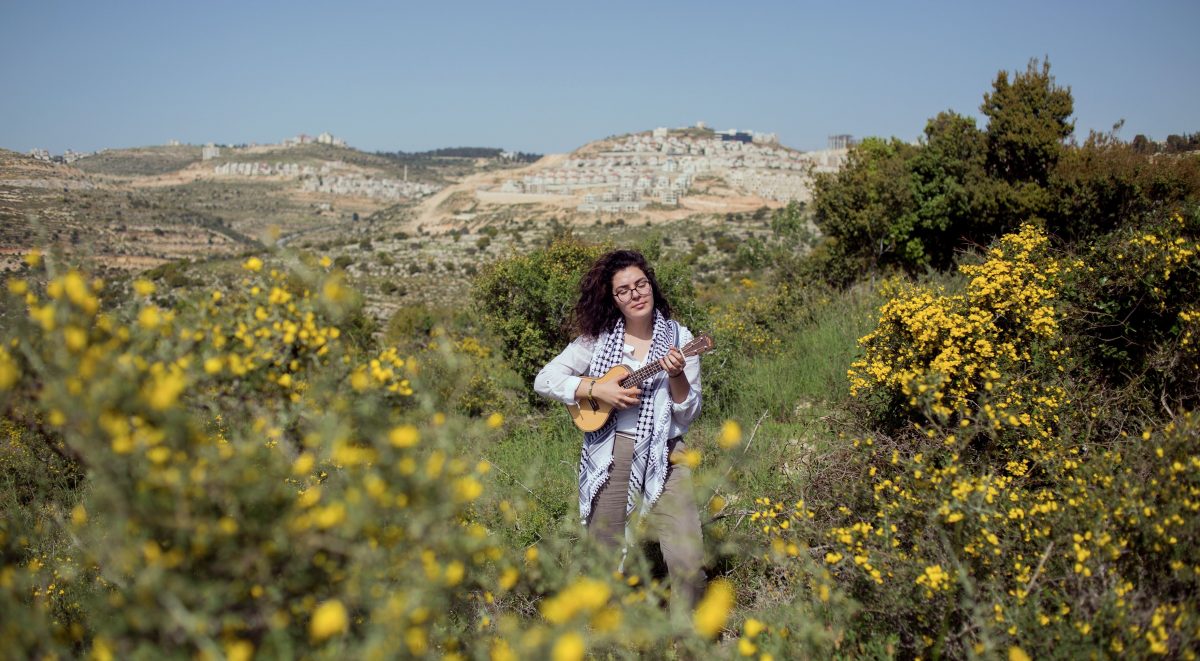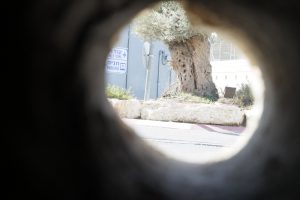
Voices from the South – September 2019
On the occasion of the World Week for Peace in Palestine and Israel (WWPPI) in September 2019, Sama Anfous of Karibu partner Kairos Palestine visited Norway for a series of open events and presentations.
Karibu spoke with Sama during her visit, and asked her about the daily realities of living under Israel’s military occupation, about the impact of the Kairos Document since its launch in 2009, and the work ahead for the Kairos movement in the struggle for a just peace.
This interview has been edited for brevity and clarity.
Karibu: You live in Ramallah with your husband and 3-year old daughter. How does the Israeli military occupation affect you as a woman, mother and activist?

Sama Anfous: The occupation affects us in many ways, but we feel it especially when we travel outside of the city. My husband and I are both “West-Bankers,” which means we live in West Bank hold a green West-bank ID. In practice, this means we are not allowed to go to Jerusalem nor can we cross easily into Bethlehem. So, we need to find alternative roads to even go to Bethlehem. What normally should take 30 minutes to drive can take up to three hours with checkpoints etc.
Stopping at checkpoints, there are always Israeli military forces holding weapons. My husband has been several times taken out of the line or the car and made to sit on the side of the road for an hour. My daughter sees all of this, and I am quite hesitant to tell her the truth, the reality of this conflict. But she sees it in the checkpoint, sees the weapons, and has started to ask, “Mamma, what is he holding?” We want to avoid showing her such things. But now she is realizing what is happening. I don’t want her to have hatred, as we especially teach her to love your enemy, but this is hard.
As an activist, I need to be careful what I mention in public as it can affect my work and family. This is both in social media and in reality. Whenever you post something or make a campaign on a larger level, you run the risk of being detained. You feel like you really want to do something to make a change, but you might be kept for several years without having a court hearing or reason for being in jail. When I was alone before I was married and had children, I didn’t care much. But now it’s different. We have a bad economic situation; we need to work and we don’t want to put our families at risk.
Karibu: In December this year, the Palestinian Kairos document will celebrate its 10th anniversary. How do you think the Kairos-movement has developed in the last 10 years?
Sama Anfous: Kairos started 10 years ago as a platform where Palestinian Christians have been able to stand together and speak out against what is happening to us. Leaders and members of many Christian communities (Latin, Orthodox, Lutherans and more) came together and wrote the document together, writing about the need and right to resist. In many ways, the writing of this document has given us as Christians the power and the ability to speak up loudly against the injustices we are facing since we know have the support from the church leaders.
The document is based on the principles of faith, hope, and love. This is something really powerful, as every human being understands these elements of faith, hope and love in various ways. Holding these three points, it is has helped us as Palestinian Christian to resist the occupation with love. We don’t need to fight for revenge or death. We need to fight to liberate our country with love in order to reach for a lasting just peace. We need to work together to stop the occupation and all the discrimination that is happening. The Kairos Document has provided the needed encouragement from our religious leaders to stand hand-and-hand.

Photo credit: Sama Anfous
The leaders of the Kairos movements also encouraged solidarity with the Muslim leaders. Whenever there is a struggle that affects either the Christian or Muslim community, we stand hand in hand together. One example I can give is from the Al-Aqsa Mosque in Jerusalem a few months back. When Israeli military forces came to remove the people, Christians and Muslims resisted by praying peacefully together. This power of unity together has given us the courage to resist in peace.
On top of this, the Kairos Document led to the Global Kairos for Justice movement, with seminars, lectures, international conferences where we are able to speak about Kairos itself globally. More and more people are getting knowledge of the Palestinian case. We know we have a backup.
Karibu: During the 10-year commemoration of the Kairos Document later this year, young activists like yourself will launch a supplement to the Kairos document. Can you tell us more about this and what you see as the future for Kairos Palestine?
Sama Anfous: I personally have been active with the Kairos for the past two years, together with 16 other young people from different regions in Palestine. We were trained as “youth ambassadors” on this document, and we are prepared to do lectures, seminars, book teaching, campaigns, advocacy campaigns in our regions based on the message and methodology of the Kairos document. In this way, the Kairos Document has become more than just a document – it is a living document with young people working to continue spreading its message.
The supplement aims at receiving a blessing from the religious leaders to continue the work of the Kairos document in the different regions in the West Bank and hopefully Gaza. Our message and goal is that we want to encourage others, especially those in particularly marginalized areas in Palestine, to act in hope, faith and love as they continue to resist injustice.
One example is in refugee camps, where the situation is particularly hard. People live in poverty, and live in very dense conditions. Many have had family members killed by the Israelis, and psycho-social trauma is common. How can we tell them to love their enemy? It is quite hard. We need to try to engage into these marginalized areas, working with young people to understand the message of the Kairos Document. That you can resist and love at the same time. We all want a better life. We want to move together in peace. The Kairos helps us in given us tools to resist in non-violent ways. For the future, we need to continue to point this out.
Karibu: What is one concrete thing people of good will can do in Norway, and around the world, to support the work you are doing?
Sama Anfous: I would invite all of you to COME AND SEE. I am talking from my perspective, and you might think I am one-sided. But come and see the truth. Come see the checkpoints and restrictions from movement from one place to another. Come see the settlements that are located in our land, in the West Bank, by the UN resolution this is illegal.
Come and see how we still love life! We don’t always think about how we struggle. We have music, we have sport. Come see the life of people! It is important to tell each other, your friends and family.
Kairos Palestine
Kairos Palestine is a Christian Palestinian movement, born out of the Kairos Document, which advocates for ending the Israeli occupation and achieving a just solution to the conflict. The Kairos Document is the word of Christian Palestinians to the world about what is happening in Palestine.
Sama Anfous is originally from the village of A'boud, northwest of Ramallah, Palestine. She has a background in journalism, and works for social change based on human rights and breaking stereotypes – working particularly with marginalized societies to promote social responsibility and justice. She is a youth ambassador for Kairos Palestine.

